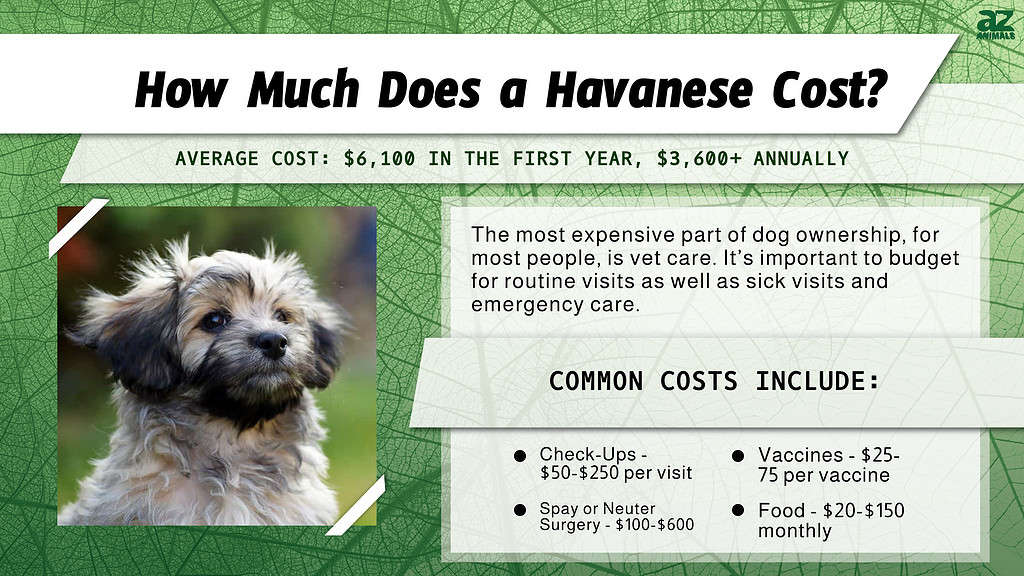Havanese prices can range considerably. As living animals, they can be quite unpredictable in their varying needs and wants. You’re also likely to spend differently from other Havanese owners based on your budget and preferences.
A middle-ground budget for a Havanese puppy is $6,100 in the first year and $3,600 annually for the remainder of the dog’s life. These dogs have long lifespans, and you can expect to pay around $53,000-$60,000 in lifetime expenses.
These numbers include food, pet insurance, spay or neuter, annual check-ups, vaccines, parasite prevention medications, and yearly dental cleanings. They also include the cost of your puppy and initial purchases.
To see how we came to these numbers, please see each section below for a breakdown of each cost.
Please remember that Havenese prices may change based on your area and are approximations. They are not meant to guarantee how much you will spend on your Havanese but to give you an estimation and some budget items to consider.
How Much Does a Havanese Puppy Cost?

A reputable rescue or breeder is the best place to adopt a Havanese puppy.
©Denise Hasse/iStock via Getty Images
Havanese puppies from breeders typically cost $1000-$2500, with some pups costing more. The price of a rescue Havanese is almost always under $500.
It’s essential to research your breeder or rescue to ensure they’re operating ethically. Unfortunately, even some so-called rescues are puppy mills in disguise.
All breeders should have OFA health testing results available, and they won’t breed dogs with genetic health issues. A reputable breeder will have their puppies vetted and chipped with their name included in case the dog ends up in a shelter. Your contract should state that the puppy goes back to the breeder if you cannot care for them at any time, no matter their age.
Reputable breeders also have waitlists, and being able to adopt a puppy the same day you inquire about them is a red flag.
Regarding rescues, having mostly young puppies available for adoption can be a red flag. Look for rescues registered as 501c3 nonprofits, and always do your research before adopting.

Other Factors That Influence the Purchase Price of a Havanese
Your breeder’s location, the puppies’ pedigree, and more can affect the purchase price of your Havanese puppy. If the breeder lives someplace with a low cost of living, they’re likely to charge less than someone who lives in an expensive city.
Puppies with award-winning or even famous lineage will cost more than puppies without.
Of course, whether you’re shopping with a reputable breeder will also impact the price of your puppy. Very low or high prices often indicate that you’re dealing with a puppy mill or backyard breeder who isn’t doing their due diligence for the dogs.
A couple of things that should never impact price if you’re shopping with a reputable breeder are the color and sex of the dog.
Cost of Vaccination and Other Medical Expenses for Havanese

The first year of a puppy’s life comes with a lot of veterinary expenses.
©Dorottya_Mathe/iStock via Getty Images
For most people, the most expensive part of dog ownership is vet care. It’s important to budget for routine visits, sick visits, and emergency care.
Because these costs can quickly add up, many people choose to pay for pet insurance to cover illness and emergencies. Some pet insurance plans also cover wellness care, though they tend to be more expensive.
Vaccines – $25-75 per vaccine
Depending on your area, your vet’s pricing, and which vaccine you get, they can cost anywhere from $25-$75. The first year is the most expensive when it comes to vaccines, as your dog will need their initial shots and boosters.
Moving forward, by law, you’ll need to pay for a rabies vaccine once every three years. Other vaccines are optional, but many are highly recommended.
Rabies and DHLPP are considered core vaccines, meaning they’re recommended for all dogs. Several other common vaccines are recommended based on a dog’s lifestyle. For instance, dogs who spend much time interacting with other pups require more vaccines to keep them safe. Your dog groomer, daycare, or boarding facility may even require these vaccines to prevent disease outbreaks amongst their clients.
Below are the most common dog vaccines and information about each.
| Vaccine | Initial Timeframe | Boosters | Core Vaccine? |
|---|---|---|---|
| Rabies | 12-16 weeks old | One year after initial vaccination, then once every three years | Yes |
| DHLPP (distemper, hepatitis, leptospirosis, parainfluenza, and parvo) | Six weeks old | Eight weeks, 12 weeks, and 16 weeks old Another booster one year later, then once every one to three years | Yes |
| Bordetella | Six to eight weeks old | 10-12 weeks old, then once every six to 12 months | No |
| Leptospirosis | 12 weeks old | Two to four weeks after initial vaccine, then yearly boosters | No |
| Canine Influenza | 6-8 weeks old | Two to four weeks after initial vaccine, then yearly boosters | No |
| Lyme | 8-10 weeks old | Two to four weeks after initial vaccine, then yearly boosters | No |
| Coronavirus | 6-12 weeks old | Two to four weeks after initial vaccine, then yearly boosters | No |
| Rattlesnake Vaccine | 16 weeks old | 30 days after initial vaccine, then boosters every six to 12 months | No |
Most dogs won’t need every vaccine on this list. Some depend on lifestyle, such as the Bordetella or Canine Influenza vaccines, while others are recommended based on location, like the Lyme and Rattlesnake vaccines.
Please speak with your veterinarian about what vaccines they recommend. If your budget restricts the number of vaccines you can get, they can discuss your dog’s risk levels and recommend which to prioritize.
Core vaccines will cost $125-$375 in the first year and $50-$150 every three years. If your vet recommends the DHCPP vaccine yearly, you’ll pay more.
For a higher estimate, dogs needing the above vaccines will cost $475-$1575 in the first year and $166-$700 each year after.
Your numbers will likely fall somewhere in the middle, but you should also account for exam fees and other parts of each visit, such as blood tests or parasite preventative. These are covered in other sections of this article.
Spay or Neuter Surgery – $100-$600
Spaying or neutering your Havanese can vary considerably in price depending on the cost of living in your area and where you have the procedure done.
You can expect to pay more at the vet’s office than at a low-cost clinic. Your dog will also typically get much better, one-on-one care, so it is worth it if it’s something you can afford.
Otherwise, the ASPCA keeps a great list of low-cost spay and neuter programs that typically cost less than $100.
Check-Ups – $50-$250 per visit
Your Havanese should see their vet for a check-up at least once a year, even if they appear healthy. These visits should ideally include a physical exam, bloodwork, stool sample, and heartworm test. This is also when you can purchase new heartworm-prevention medications.
The most expensive part of the exam will likely be routine bloodwork, but this can ultimately save you thousands of dollars–and your dog’s life!–if it happens to catch an illness early.
Parasite Prevention Medications – $100-$400
The cost of parasite prevention depends on which parasites you focus on and which medications you purchase. Many medications that cover fleas, mites, and ticks don’t cover heartworms so you may end up with two medications for that reason.
Although parasite prevention medications are technically optional, it’s almost certain that your dog will get parasites without them. They’re typically more expensive and time-consuming to get rid of than they are to prevent in the first place.
Heartworm medication is especially important, as heartworm is both painful and expensive to treat.
Dental Cleanings – $300-$700+ per treatment
Small dogs like Havanese are more prone to dental health problems than larger breeds. Staying on top of brushing their teeth is extra important to prevent plaque build-up.
However, it’s still likely that your dog will need professional dental cleanings from the vet and potentially other procedures such as pulling teeth.
Dental cleanings cost over $300, and extensive dental work can cost over $1000.
Sick Vet Visits – costs range widely
There’s no predicting when your Havanese will get sick, which illnesses they will develop, or how much vet care will cost. This is why having either pet insurance or a large savings account is essential.
Some ailments, like simple outer ear infections, cost only a few hundred dollars to treat. But others, such as a luxated patella that needs surgery, can cost thousands.
Common Havanese Health Conditions
Some common Havanese health conditions include:
- Luxating patella – $1000-$5000 for each knee if surgery is needed
- Hip dysplasia – $1000-$7000+ for each hip if surgery is needed
- Legg-Calve-Perthes disease – $2000-$4000 for surgery, medications, and post-surgical care
- Dental disease – $500-$2500 for tooth extractions if needed
Cost of Food and Supplies for Havanese

Food and supplies tend to cost less for Havanese than for larger dog breeds.
©Dorottya Mathe/Shutterstock.com
Food – $20-$150 monthly
Feeding your Havanese can cost anywhere from $20-$150 a month, depending on what kind of food you purchase and the size of your Havanese. As you may expect, a large 15-pound Havanese will eat more than a small seven-pound pup!
Kibble is the cheapest to feed, while canned, fresh, and raw foods cost more. Everyone has different opinions on dog food, but your best bet is going to be a vet-recommended brand that follows WSAVA guidelines for a scientifically-based diet.
While some people have success with raw foods, it has its risks–and isn’t recommended by the Federal Department of Agriculture (FDA) or the American Veterinary Medical Association (AVMA).
Initial Purchases $50-$150+
Initial purchases are one-time expenses you’ll ideally purchase before bringing your dog home or shortly after. These include:
- Food and water bowls
- Collar and leash
- Brush and comb
- Nail clippers or Dremel
- Harness (optional)
- Crate (optional)
- Crash-tested dog seatbelt or car crate (optional but highly recommended)
Repeat Purchases – costs range widely
Repeat purchases include things you’ll need to replace throughout your dog’s life, such as:
- Toys
- Treats
- Dental care items
- Replacement collars and leashes
- Any chewed-up household items
Havanese are relatively cheap dogs in this regard, as they aren’t likely to destroy large household items, like the couch. They also tend to require smaller, more inexpensive items than other dog breeds.
Household Purchases – costs range widely
Costs can also range widely for household purchases, depending on your purchases. None are technically required, and you may have some already.
Here are some household purchases to consider when you budget for your Havanese:
- Pet gates
- Fencing
- Furniture covers
- Car seat covers
- Pet stairs or ramps
How Much Does It Cost to Insure a Havanese?

Pet insurance is expensive but can save you money in an emergency.
©Dorottya Mathe/Shutterstock.com
Pet insurance for a Havanese can cost anywhere from $20-$200 a month. It depends on the company and plan you choose.
The more expensive plans, predictably, cover more of the vet bill. Be sure to look at the deductible (how much you have to pay before the insurance will cover anything), the percent of vet bills the insurance will cover, and what they cover. For instance, most plans don’t cover routine vet visits or exam fees.
If you want pet insurance for your Havanese, it’s important to purchase it quickly. This is because most plans won’t cover preexisting conditions, meaning anything your dog shows symptoms for or is diagnosed with before the insurance goes into effect. Waiting until your dog is sick to purchase insurance means that the illness likely won’t be covered.
If you don’t purchase pet insurance for your Havanese, it’s strongly recommended that you have a large savings account instead. Eventually, your dog will need veterinary care, and it’s important to be prepared.
How Much Does It Cost to Train a Havanese?
Most people do not pay for professional training, meaning they pay nothing or very little. If you choose this route, you’ll only have to pay for supplies like a clicker or dog treats.
Puppy classes are another popular option that is especially good for first-timers. They tend to cost a few hundred dollars on average.
These classes teach you and your dog the basics and allow you to practice obedience while surrounded by other dogs. Being able to pay attention to you despite these distractions is a great skill for your Havanese to learn!
You can also usually attend more advanced group classes if you want, though it adds to the expense.
Lastly, one-on-one training can cost hundreds to thousands, depending on what the training is for and how many sessions you book.
Whether you’re training your dog yourself or getting professional help, please avoid aversive training methods. Don’t be afraid to ask trainers what their methods are and to walk away if they aren’t entirely transparent.
Lifetime Costs of a Havanese
Havanese live 14-16 years on average. Assuming everything above falls into the middle of the spectrum and your pup doesn’t have any illnesses or veterinary emergencies in the first year, you can expect to pay upwards of $6,100. This doesn’t include household or repeat purchases or dental care.
In the following years, you can expect to pay $3,600+ annually, including dental cleanings but not sick vet visits, emergencies, or repeat purchases. This comes to a lifetime total of around $53,000-$60,000.
Many people will spend more on their dogs, and some will spend less. What’s certain is that they’re a big financial commitment! It’s important to plan out what you will purchase from the list above to see if you can afford to care for your Havanese in a way that feels right to you.
Thank you for reading! If you have feedback on this post, please contact the AZ Animals editorial team.
The photo featured at the top of this post is © Denise Hasse/iStock via Getty Images
Ready to discover the top 10 cutest dog breeds in the entire world?
How about the fastest dogs, the largest dogs and those that are -- quite frankly -- just the kindest dogs on the planet? Each day, AZ Animals sends out lists just like this to our thousands of email subscribers. And the best part? It's FREE. Join today by entering your email below.
Thank you for reading! Have some feedback for us? Contact the AZ Animals editorial team.







